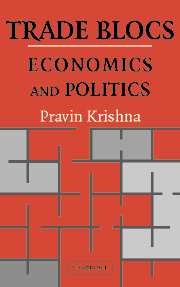Book contents
- Frontmatter
- Contents
- List of Figures
- List of Tables
- Acknowledgments
- 1 Introduction and Overview
- 2 The Economics of Preferential Trade Areas
- 3 Necessarily Welfare-Improving Preferential Trade Areas
- 4 Geography and Preferential Trade Agreements: The “Natural” Trading Partners Hypothesis
- 5 Preferential Trading and Multilateralism
- Appendices
- References
- Index
5 - Preferential Trading and Multilateralism
Published online by Cambridge University Press: 30 July 2009
- Frontmatter
- Contents
- List of Figures
- List of Tables
- Acknowledgments
- 1 Introduction and Overview
- 2 The Economics of Preferential Trade Areas
- 3 Necessarily Welfare-Improving Preferential Trade Areas
- 4 Geography and Preferential Trade Agreements: The “Natural” Trading Partners Hypothesis
- 5 Preferential Trading and Multilateralism
- Appendices
- References
- Index
Summary
In the recent revival of interest in PTAs, academic and policy discussions have been dominated by debates over the question of the impact of PTAs on the success of the multilateral process. Many have argued that multilateralism is too slow and inefficient a way of getting to the commonly held ideal of global free trade and that PTAs offer a quicker and surer way. In this context, interesting political-economy-theoretic questions relating to the interaction between bilateral agreements and multilateralism have been raised: Are there incentives for FTAs to keep expanding with more members so as to move toward multilateral free trade eventually, or will there be incentives instead to keep new members out?
To get to the question of the interaction between bilateral agreements and multilateralism with which this chapter is concerned, it is important to identify the factors that influence the determination of trade policy. Modeling the full range and relative magnitudes of these factors is a difficult task. It is, however, obvious that producers and producer interests play a strong role in determining trade-policy outcomes. Therefore, we start by describing a rather simple political economy framework in which the role of producers is decisive in determining the choice of reciprocal tariff-reducing arrangements. Trade policy is driven by the gains or losses of domestic firms under the different trade arrangements being considered. Alternate political economy frame-works are subsequently considered.
- Type
- Chapter
- Information
- Trade BlocsEconomics and Politics, pp. 107 - 138Publisher: Cambridge University PressPrint publication year: 2005



